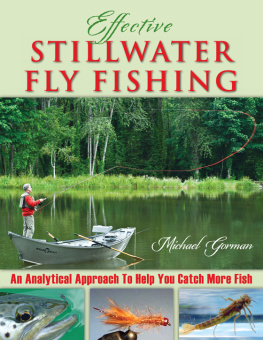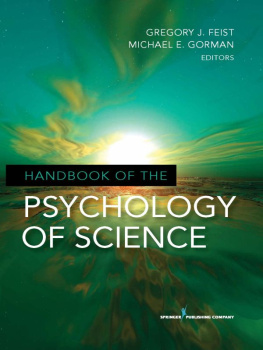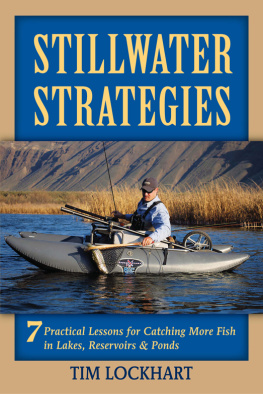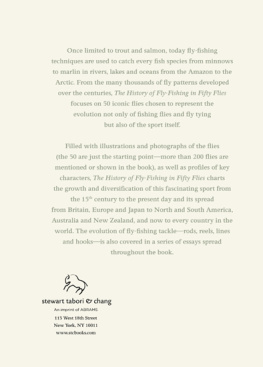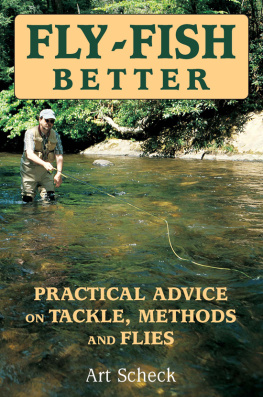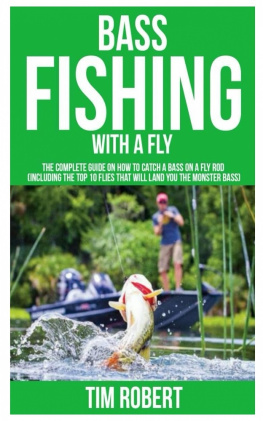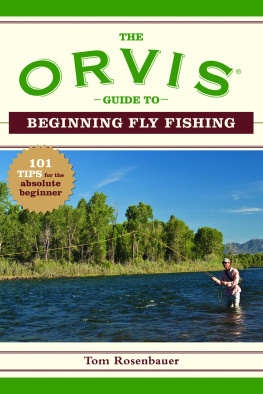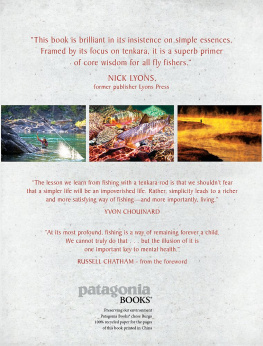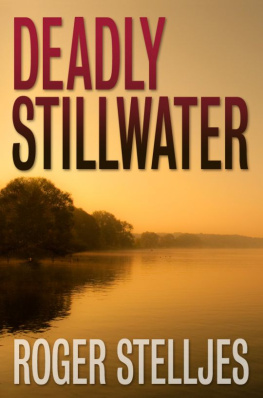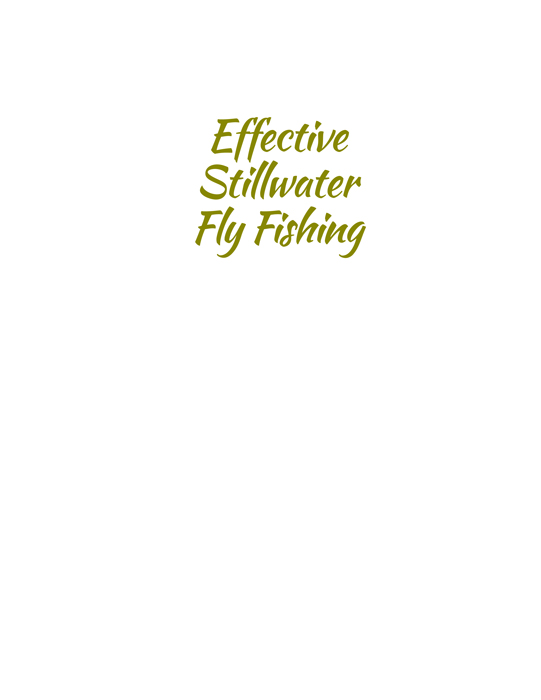
Joann Severson, ace fly angler and Worlds Best Sister
No one on Planet Earth gives me greater pleasure when playing a worthy fish than my sister Joann. And very few people are as appreciative of my guiding efforts as she is. Her fly-fishing focus, her patience with her big brothers casting and fishing instructions, and her relentless joy make Joann my all-time favorite fishing guest. Besides excelling at trout fishing in lakes and streams, she is an excellent steelhead fly fisher.
Copyright 2014 by Stackpole Books
Published by
STACKPOLE BOOKS
5067 Ritter Road
Mechanicsburg, PA 17055
www.stackpolebooks.com
All rights reserved, including the right to reproduce this book or portions thereof in any form or by any means, electronic or mechanical, including photocopying, recording, or by any information storage and retrieval system, without permission in writing from the publisher. All inquiries should be addressed to Stackpole Books, 5067 Ritter Road, Mechanicsburg PA 17055.
Printed in the United States of America
10 9 8 7 6 5 4 3 2 1
First edition
Cover photo: Michael Gorman and Lesley Arle
Cover design: Caroline Stover
Library of Congress Cataloging-in-Publication Data
Gorman, Michael, 1950
Effective stillwater fly fishing : an analytical approach to help you catch more fish / Michael Gorman. First edition.
pages cm
ISBN 978-0-8117-1301-6
eISBN 978-0-8117-5915-1
1. Trout fishingHandbooks, manuals, etc. 2. Fly fishingHandbooks, manuals, etc. I. Title. II. Title: Effective still water fly fishing, an analytical approach to help you catch more fish.
SH687.G67 2014
799.124dc23
2013033841
INTRODUCTION
M ore fish, bigger fish, and plenty of elbow room to catch them: these are the things that learning to successfully pursue fish in lakes and ponds will offer the resourceful fly angler. Sounds good, but...
I have some angling friends who have excellent fly-fishing skills, but they absolutely refuse to fish lakes or ponds. Its mostly pride, I think. They have a low threshold for the pain of a humility injury. Because lake fish have not always come easily to these folks, they wade and boat only streams and rivers where fishmostly trout out here in the Pacific Northwestare more easily located and caught. For them, lakes are too demanding, with too many puzzles to solve, and their fish-catching egos might be bruised.
It is true: all good lake fishermen know defeat, as measured in fish-landed success. Its part of the learning process. So why fish lakes? When my students in Oregon State Universitys fly-fishing and fly-tying classes pose this logical question, I reply with the three good reasons I gave in my opening sentence: elbow room, lots of fish, and the possibility of BIG fish. Ill expand briefly.
Elbow room: River fishermen have their favorite spots. I am no exception. Stream fish hold in very specific, sometimes small, areas. That can be a big downside to moving waters: when the fishing is good and the weather is nice, other anglers may commandeer every single place I want to fish. Grrrr!
Lots of fish: River fish concentrate in relatively tiny zones for the combination of food, safety, and comfort. Small neighborhoods that meet all three criteria limit the number of fish in most streams, as compared to the prime habitat and food production broadly available in quality ponds and lakes. So angler crowding on stillwaters is usually not to the same degree as that found on streams. With more food available in more areas in quality lakes, there are simply more fish per square surface acre.

A floating craft is a necessary tool to be consistently successful on most stillwaters.
Big fish: If a fisherman wants to try for a truly large resident, non-migratory trout, or a lunker bass, the best chances will be found in productive stillwaters.
These three considerations make it rationally desirable for fly anglers to learn how to effectively fish lakes and ponds. However, reason can fly out the window when frustration and its related emotions come into play in the fishermans psyche.
Sometimes even a mediocre fly angler can put up All-Star statistics on lakes. The fish seem to be everywhere he casts his fly, and the pattern and method are not important to success. It is days like these that can create a false confidence in the fly fisherman, whereby he believes he actually knows the basicseven the skilled nuancesof catching worthwhile trout in stillwaters. Rude surprises and frustration are only one fishing trip away for delicate egos.
Even the best stillwater anglers I know in my large circle of angling friends and acquaintances meet total defeat now and then. Me, too. There seem to be two camps of emotional reaction to being humbled on stillwaters: 1) resignation to only fish rivers and streams or 2) embracing the challenge with a determination to figure out the puzzle next time. My hope is that after reading this book you will always be in the camp with those who are inspired by a beating on a lake to turn it into a positive determination to learn more, discover more solutions to fishing challenges, and take pleasure in future fish-catching successes when you can correctly arrange all the puzzle pieces on a lake when others cannot.
The chapters that follow are replete with many of my personal experiences so that you may learn from my challenges and my solutions, and understand the outlook that drives me to always want to learn more about fly-fishing stillwaters, and, as a result, catch more fish on a consistent basis. Besides conveying effective fish-catching tools, skills, and knowledge, this book is intended to giveas best it canthe healthy psyche-preserving mental approach to successfully catching stillwater fish. It is for those who want to overcome the psychological defeat that we all inevitably deal with when fly fishing lakes.
Before I sat down to write this introduction, I read a magazine article about fly fishing lakes. The author presented his views on necessary fly lines, trick techniques, where the trout will likely be in the lake at any given point during the fishing day, and some fly recommendations. This was all well and good for a brief, no frills article. However, I found myself saying to the author, Tell me a situation where you would truly need a Type VI sinking line, where a Type III or IV would not do the same job. Tell me a story to illustrate, so that I might believe. Or, Why is this particular damsel nymph you have suggested superior to the other damsel patterns available on the market? Tell me a story about the day it produced for you when others would not. Convince me why I should use your methods, your tackle, your fly recommendations. Tell me about lake fishing puzzles you encountered and solved with your techniques, your special equipment, and your special flies. Make me believe you really know what you are writing about.


